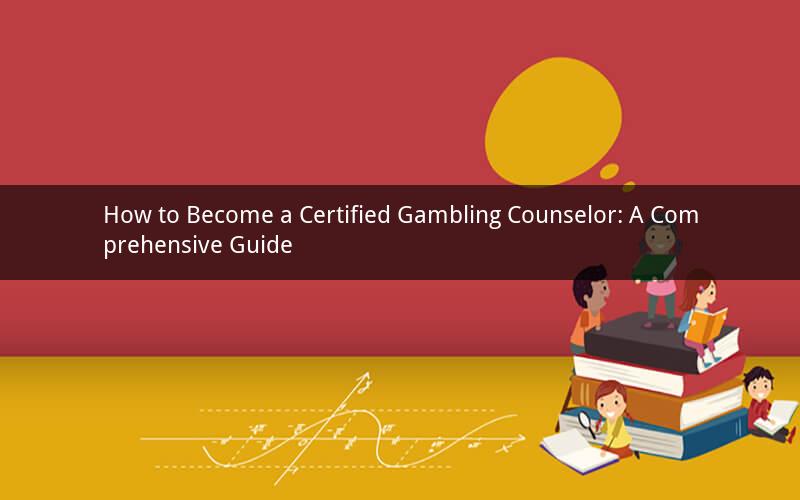
Becoming a certified gambling counselor is a noble career choice that requires dedication, empathy, and a strong desire to help those struggling with gambling addiction. This article delves into the steps and requirements to become a certified gambling counselor, providing valuable insights and information for aspiring professionals in this field.
1. Understanding the Role of a Certified Gambling Counselor
A certified gambling counselor is a trained professional who specializes in providing support and guidance to individuals with gambling problems. They work with clients to develop strategies for managing their addiction, offering therapy, and connecting them with resources to support their recovery journey. The role of a certified gambling counselor is crucial in addressing the growing issue of gambling addiction and promoting responsible gambling practices.
2. Educational Requirements
To become a certified gambling counselor, most programs require a minimum of a bachelor's degree in a related field, such as psychology, social work, counseling, or addiction studies. The specific requirements may vary depending on the certification board and the program you choose. It is important to research and select a program that aligns with your educational background and career goals.
3. Training and Certification Programs
After completing your undergraduate degree, the next step is to enroll in a training and certification program. These programs are designed to provide comprehensive training in gambling counseling techniques, ethics, and practical skills. They often include coursework, internships, and supervised clinical experience. Some reputable organizations offering certification programs include the National Council on Problem Gambling (NCPG), the National Association of Gambling Studies (NAGS), and the National Certification Board for Addiction Professionals (NCBAP).
4. Coursework and Curriculum
The curriculum for a gambling counselor certification program typically covers a wide range of topics, including:
- The history and prevalence of gambling addiction
- The psychological, social, and financial consequences of gambling addiction
- Assessment and diagnosis of gambling disorders
- Treatment modalities and therapeutic techniques
- Ethical considerations in gambling counseling
- Case management and relapse prevention strategies
The coursework is designed to provide a solid foundation in the field, preparing you to work effectively with clients and handle various challenges in your practice.
5. Internship and Clinical Experience
Most certification programs require participants to complete an internship or clinical experience under the supervision of a qualified professional. This hands-on experience allows you to apply the knowledge and skills you have learned in a real-world setting. It also provides valuable insights into the day-to-day responsibilities of a gambling counselor and helps you develop your clinical skills.
6. Certification Examination
Once you have completed your training and internship, you will need to pass a certification examination to become a certified gambling counselor. The examination typically assesses your knowledge of gambling counseling principles, ethics, and clinical skills. The specific format and content of the examination will depend on the certification board you choose to pursue.
7. Continuing Education and Professional Development
To maintain your certification, you will need to complete continuing education units (CEUs) and engage in professional development activities. This ensures that you stay up-to-date with the latest research, treatment methods, and industry trends. Continuing education also helps you refine your skills and expand your expertise as a gambling counselor.
8. Building a Career as a Certified Gambling Counselor
After becoming certified, you can seek employment in various settings, such as:
- Private counseling practices
- Hospitals and healthcare facilities
- Community-based organizations
- Government agencies
- Research institutions
As a certified gambling counselor, you will have the opportunity to make a significant impact on the lives of individuals struggling with gambling addiction. Your role will be vital in promoting responsible gambling practices and supporting the recovery process.
9. Frequently Asked Questions
Q1: What is the difference between a gambling counselor and a gambling therapist?
A1: While both professionals work with individuals struggling with gambling addiction, a gambling counselor typically focuses on providing support and guidance, while a gambling therapist may use more intensive therapeutic techniques, such as cognitive-behavioral therapy (CBT).
Q2: Can I become a certified gambling counselor without a degree?
A2: Most certification programs require a minimum of a bachelor's degree in a related field. However, some programs may offer alternative pathways for individuals with relevant experience or certifications.
Q3: How long does it take to become a certified gambling counselor?
A3: The time it takes to become a certified gambling counselor varies depending on your educational background, the program you choose, and the amount of time you dedicate to your studies and internships. On average, it may take 2-4 years to complete the necessary requirements.
Q4: Is it possible to work as a gambling counselor without being certified?
A4: While it is possible to work in the field of gambling counseling without certification, being certified can enhance your credentials and open up more opportunities for employment and career advancement.
Q5: What are the benefits of becoming a certified gambling counselor?
A5: Becoming a certified gambling counselor offers numerous benefits, including increased job opportunities, a higher level of professional recognition, and the ability to provide more effective and evidence-based services to your clients.